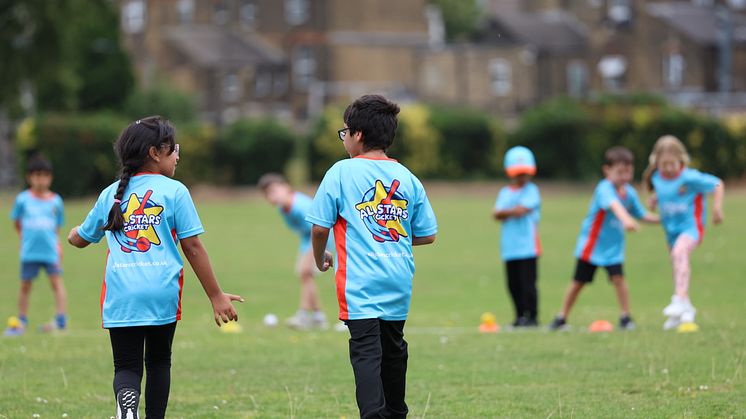
Press release -
The ECB sets out action to make cricket more inclusive following ICEC report
The ECB is today publishing details of further steps it will take to make cricket a more inclusive sport in response to the recent report by the Independent Commission for Equity in Cricket (ICEC).
Wide-ranging action aims to tackle discrimination and break down barriers for women and girls, people from lower socio-economic groups, and ethnically diverse communities.
It will accelerate and bolster work already under way across the game designed to make cricket the most inclusive team sport in England and Wales – and aims to address the ICEC’s conclusions that structural and institutional racism, sexism and class-based discrimination continue to exist across cricket.
The response includes:
- Enhanced EDI education and setting new values and behaviours for the ECB to help create a game-wide transformation in culture.
- Investing a minimum of £25m per year above forecasted women’s revenues to further grow the women’s and girls’ game at every level during the current broadcast cycle (which runs until 2028).
- Introducing further independence in our regulatory processes by establishing a new Cricket Regulator, overseen by an independent Cricket Regulatory Board - and ring-fenced from the rest of the ECB - which will be responsible for enforcement of regulations and carrying out investigations.
- Increasing match fees for England Women to equalise them with England Men, and tripling the number of girls’ club teams by 2026.
- Working with partners in the wider game to design an enhanced and expanded Talent Pathway that aims to remove barriers and increase opportunity. Our aim is that by 2025, finance will not be a barrier for Talent Pathway participants.
- Developing Action Plans, as requested by the ICEC, to tackle barriers for state school pupils and Black and other Ethnically Diverse communities.
- Investing an extra £2m into charity partners to boost their work in breaking down barriers, particularly for state school, Black and British South Asian children and young people – the African Caribbean Engagement (ACE) Programme, Chance to Shine, Lord’s Taverners, MCC Foundation and South Asian Cricket Academy (SACA).
- Developing a game-wide Volunteering Strategy and integrating key EDI principles into training.
- Providing support and training across the cricket network to enhance understanding of discrimination and the management of complaints across the cricket network, as well as launching a charter setting out clear expectations of both complainants and the investigating body to ensure a fair and transparent outcome for all.
- Adding victimisation as an offence in the Anti-Discrimination Code.
- Including enhanced EDI standards in the next County Partnership Agreements (CPAs) from 2025, and adding more ambitious County Board targets for gender diversity and ethnic diversity based on local demographics. Venues hosting major matches will be assessed against their performance against EDI minimum standards.
Today’s response follows a three-month period of consultation following the report’s publication. The ECB has held more than 50 consultation meetings with a wide range of cricket organisations, equality experts, charities and individuals to help us identify how best to implement the findings. We are taking forward most of the ICEC’s recommendations. Many we will be implementing by the letter – or, indeed, have already been implemented. Others we will implement in slightly different ways or to a different timescale, and there are only a small number we will not take forward.
The response also sets out how the ECB will report on progress, including annual progress updates on our EDI Action Plan and a full State of Equity report every three years. To provide further independent perspectives and expertise to help us become the most inclusive sport, we will will also establish an EDI Advisory Panel with a wide range of expertise to help us ensure that our investments and initiatives are having the intended impact.
Richard Thompson, ECB Chair, said: “On the day the ICEC published its report, I apologised without reservation on behalf of cricket’s wider leadership to anyone who has suffered discrimination or felt excluded from our sport. As well as reiterating that apology here, I reaffirm our absolute commitment that cricket will strive to become the most inclusive sport in England and Wales.
“There is no doubt that the ICEC highlighted to great effect the impact of discrimination on individuals and the extent of the systemic challenges to be addressed. Its in-depth analysis also presented an opportunity to put in place a comprehensive plan of action that will deliver meaningful change and rebuild trust among the communities we serve.
“This response represents a set of actions that will accelerate and intensify our work to make cricket a game for everyone, actions that cricket can deliver and fund within an achievable timeframe. It builds on a huge amount of work which is already under way right across the network.
“Cricket hasn’t got it right in the past, but this is an opportunity to move forwards together. I’d urge everyone to now come together, to put their energy and effort into delivering these actions, and to playing their part in ensuring cricket becomes England and Wales’s most inclusive team sport.”
NOTES TO EDITORS
The Independent Commission for Equity in Cricket was formed in November 2020, to independently explore issues relating to race, gender and class within cricket.
Chaired by Cindy Butts and supported by four independent Commissioners, the Commission set out its Terms of Reference in July 2021 before undertaking research and gathering evidence from over 4,200 individuals and organisations connected with cricket.
They published their report "Holding up a mirror to cricket" on June 27th 2023.
The ECB's response is available here.
Categories




